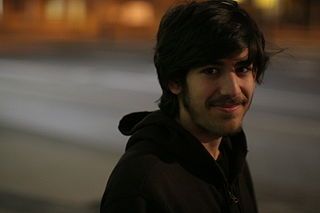Intelligence
Who Is the Aaron Swartz in Your Life?
Don't assume that those who need our support will ask for it
Posted January 15, 2013

On January 12, author and BoingBoing.net co-creator Cory Doctorow wrote a tribute to his friend Aaron Swartz, an obviously gifted young man whose particular gift was "thinking and problem solving." While many may not have known much about Swartz before his death, all of us are familiar with his contributions to how we navigate and use information technology, from RSS feeds to Creative Commons licensing.
As someone who has written books with “gifted” in the title, I nonetheless understand the complexity of the word and the potential problems with labeling. I struggle with how best to describe in a concise way young people who are exceptionally bright, curious, determined, sensitive, and intense. I am ever mindful that the children themselves often do not like to be called gifted, as it is yet another way that others can define and constrain them.
Regardless of what terms we use, however, the differences experienced by people like Aaron Swartz—differences of being out of sync with usual development (asynchronous development), self-determination, idealism, and emotional excitability—are real. Consider this description from Doctorow of his friend's asynchrony:
In so many ways, he was an adult, even then [at age 14 or 15], with a kind of intense, fast intellect that really made me feel like he was part and parcel of the Internet society, like he belonged in the place where your thoughts are what matter, and not who you are or how old you are.
Something that parents notice about gifted children is that they are often out of step with expected age-level development, living "many ages at once." Doctorow writes that Swartz “was also unmistakably a kid then, too,” eating only white food, such as steamed rice, more like a toddler than a young teen. When Doctorow told him about “supertasters,” Swartz did what so many of these intense, self-driven learners do: “He immediately researched the hell out of the subject, figured out a strategy for eating better, and sorted it.”
Doctorow also captures how perfectionism and idealism can interfere with personal relationships while at the same time driving extraordinary thinking and work:
Aaron had powerful, deeply felt ideals, but he was also always an impressionable young man, someone who often found himself moved by new passions. He always seemed somehow in search of mentors, and none of those mentors ever seemed to match the impossible standards he held them (and himself) to.
I did not know Aaron Swartz, but his life seems strangely familiar, as though I had met him not once, but many times. Not all of the young people of whom he reminds me are as precocious, but they share his excitability and intellectual intensity and deep emotionality, and I know that their parents read his story with a tug of anxiety, wondering how they can help their own sons and daughters to withstand moments of seemingly overwhelming despair.
I wish I had the answers. I don't have the personal knowledge or expertise to know to what extent Swartz's legal troubles or his inner demons led to his final decision. What I do know is that young people as obviously different from the norm as Aaron Swartz can fool others into thinking they are more self-reliant, more confident, and more emotionally resilient than they are. They can rebuff our attempts to suggest that something might be wrong or that they are not perfect. They can be prickly and aloof when we offer to help. And without meaning to, others can even express a thinly disguised glee that the gifted, too, have problems.
But, as Doctorow writes so poignantly, that doesn't mean we should leave them alone or stop trying.
I don't know for sure whether Aaron understood that any of us, any of his friends, would have taken a call from him at any hour of the day or night. I don't know if he understood that wherever he was, there were people who cared about him, who admired him, who would get on a plane or a bus or on a video-call and talk to him.
What people in our own lives, gifted or not, do we assume understand that they can talk to us, about anything, at any time, that we will not judge them, and that we, too, know the pain of imperfection and doubt? Maybe the best way to remember the life of Aaron Swartz is to tell them—today.
Then tell them again.
Photo by Jacob Appelbaum from san francisco, USA (23c3 - day 0) [CC-BY-SA-2.0 (http://creativecommons.org/licenses/by-sa/2.0)], via Wikimedia Commons




